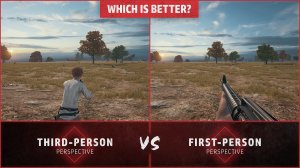The poet Johann Wolfgang von Goethe once said, “There is nothing insignificant in the world. It all depends on the point of view.” This holds true even for novel writing… perhaps especially for novel writing. It’s not just the character who tells the story, but also in what way the character tells the story that can change the entire tone of the narrative. By that, I mean first person versus third person narration. It might no seem like a big deal — in fact, sometimes the way you tell the story doesn’t even have to be decided; you just know — but you can’t ignore the significance of choosing one over the other. Perspective is everything. It’s just a matter of knowing what to pick.
What is your favorite kind of point of view to write in?
In recent times, we’ve seen a surge in first person PoV (point of view) narratives, even in genres that used to be pretty reliant on third person. Fantasy, for example, is frequently told in the third person. And there’s a reason for that. But to understand why, you first have to realize that point of view goes beyond using “I/me/our” versus “They/them/their.”
First person PoV’s strength is that it allows for a better connection between the reader and the narrator (generally, the main character). It’s not necessarily that the reader can slip into the narrator’s shoes and feel like they’re experiencing the action first-hand. Rather, the reader creates a connection with the narrator because it’s almost as if the narrator is telling their story intentionally and directly to the reader… “This is the crazy thing that happened to me, and it’s up to you to decide what to make of it.”
As such, another strength of good first person PoV is that the reader can get inside the narrator’s head. It’s tough, though, as a writer, to be able to do something like that. Finding the right balance of thought and action, and also the right thought and the right action that best defines the character speaking is required for a powerful narrative.
Third person PoV’s strength is more that it enables an author to focus on the story rather than the character. It’s easier, in a way, because it doesn’t require analyzing a character’s decisions and figuring out what they think of X event or what rationalization is needed for Y decision. At least, not to the extent of first person PoV. Because the narrator is not the main character, but is rather some external entity, there is a disconnect between the reader and the main character.
Of course, it’s worth pointing out that there are a few different kinds of third person PoV. Omniscient narration can be useful in certain circumstances, but is often difficult to wield effectively. Third person limited omniscience is generally the poison of choice, so to speak, because you get to focus on one particular character while still getting the disconnect between the narrator and the character. It makes it a bit easier to look at the conflict and the characters as a whole, mostly because you tend to get more information and can thus make up your mind on a thing in particular without the bias from the main character. And, of course, there’s always that tricky little fact that first person narrators can be unreliable, so trust in the first person narrative must come with a grain of salt.

This is why fantasy (my genre of choice) tends to be written from a third person perspective. Since third person tends to be the most flexible in being able to zoom out and give the reader more information than the main character might have access to, it makes it easier for the author to justify feeding the reader information that they might need to know for later without giving the character access to that information (either because they already know it, or can’t know it until later). Obviously, it’s also easier to justify occasionally jumping into the head of another character in another place temporarily, if that’s what the narrative calls for. Again, usually for information purposes.
However, when I say “fantasy tends to be written from a third person perspective,” what I mean is that’s the kind of fantasy I grew up on. These days, especially with Young Adult novels, the stories have become about the characters, making it so that third person narration just doesn’t cut it. If you want your reader to care deeply and utterly about your character, you’ll find yourself better equipped to do so if you step away from the fantasy tradition and step into the developing trope of the first person narration.
Leave a comment